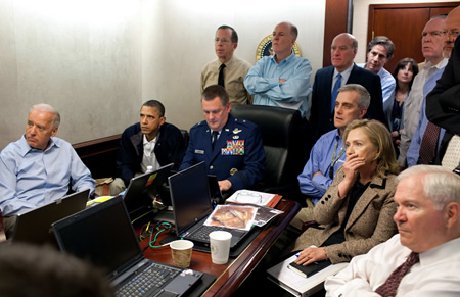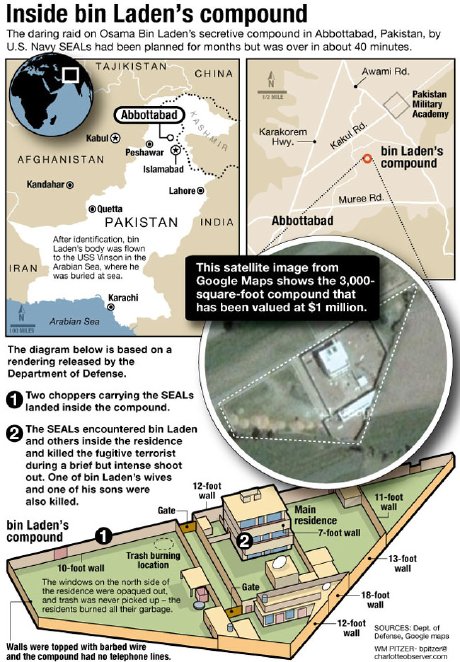Adil Najam
What do Pakistanis think about how Osama Bin Laden met his end, the implications of that end?
There are as many opinions on what happened in Abbottabad as there are Pakistanis. Maybe more. But there is no sense whatsoever where the government of Pakistan (or any of its major institutions) stand on what happened – or stood when it was happening. For 36 hours now the world has been waiting to see what Pakistan does and says – the silence and incoherence from Islamabad has not just been embarrassing, it has been damning. Finally, key institutions in Pakistan have begun trying to piece a narrative together – unfortunately it is way too late and the narrative itself rather lame.
When I put up a short post on Osama Bin Laden’s death soon after the news broke, I had hoped that in time more details would become available and we would get more clarity on what happened and how. We do now have more detail. But certainly not more clarity. The story about what happened in Abbottabad now lives in Spin-abad. Everyone – from governments, secret agencies, the media, the Twitterati, and your spinster aunt – are taking a spin. Many are taking multiple, sometimes contradictory, spins. Everyone except the Pakistan government.
That, of course, is a surprise – not only because the Pakistan government does have a lot of explaining to do, but even more because it is in the interest of the Pakistan government to do that explaining itself rather than have someone else do it for them. Yet, up until it was already too late, Pakistan seems to have abdicated that responsibility. In fact, President Barack Obama, Secretary Hillary Clinton and Senator John Kerry seemed to be making that (half-hearted) case for Pakistan more than anyone in authority in Pakistan. Given that President Obama had informed President Zardari before the speech from the US President, one would have assumed that the Pakistan President and his media handlers would have their own statement ready to go on the air minutes, if not seconds, after President Obama’s speech. This is not about spin and PR, this is Diplomacy 101: Own and define the narrative as soon and as clearly as you can before someone else defines it for you – especially if the narrative is likely to be unfavorable.
But the narrative, itself, is not the core of Pakistan’s challenges. The problem is the facts on the ground and the government’s inability and unwillingness to explain them. Pakistan is used to the feeling of the world ganging up on it. But there are good reasons for the questions being asked of Pakistan by the world today. There are even better reasons for the questions being asked of Pakistan by Pakistanis today. Whether the government comes clean to the world or not, it is vital that it respond to Pakistanis. The first is a matter of national image (no trivial issue, that), but the latter is a question of citizen trust in national institutions (an existential element of statehood).
The fact is that there is a Pakistan case to be made on this issue. And it needs to be made to Pakistanis much more than to the rest of the world. It is a case that forcefully stresses that a world, and a Pakistan, without Osama Bin Laden in it is a vastly better world than one with him in it – this is a villain who orchestrated events that have left more than 30,000 Pakistanis dead in extremism and terrorism. It is a case that legitimately highlights the sacrifices that Pakistan and Pakistanis have, in fact, made in the fight against terrorism. Most importantly, it is a case that honestly analyzes what happened in Abbottabad – it is not a surprise that Osama Bin Laden was found in Pakistan and in a large urban area (just like nearly every other major Al Qaida figure captured) – but an explanation is owed on why Pakistani intelligence failed to make the connections that led to him, an explanation is owed on exactly what Pakistan’s official role in the final operation was (or was not), and an explanation is owed on exactly what Pakistan’s strategy on countering terrorism is, who is running it, and why it is not working well enough or fast enough.
In a country and an ‘establishment’ as divided as Pakistan, this cannot be an easy conversation; it is not supposed to be. It is time to ask honest and tough questions of everyone. It has long need a necessary conversation; now is the time to have it.






















































@Eideeman
Actually the article does talk about agencies again and again. But the more important point that is that it is the PRESIDENT who should be speaking, no matter what the power equation. If nothing else, to assert that power. To give up on even speaking to the country is to abdicate. Whatever the internal politics, there is a reality of the office of the President that only the President can pull of. It does not matter whether you like the President or not, this is about the office. From the US it was the Navy Seals who carried the guns and killed Osama, but the announcement was made by the President. Its just the appropriate thing to do. I agree with you and with Adil that that the agencies and the military has failed. But it is still the President who should be the face of speaking to the nation. Imagine if Kiyani would have come on TV minutes after Obama’s speech to explain things… is THAT what you want? I would much rather have the elected government do that, irrespective of what I think of Zardari.
On blogs, news sites, facebook, twitter, etc etc every Pakistani seems to be blaming Zardari for not coming up with a proper statement, or as Adil puts it, an explanation.
Do any of you seriously think that the civilian government has any clue whatsoever about the real facts. Do you really think that they have any more knowledge about this than we do?
Why are we never able to point a finger at the military??
While Al Qaeda has butchered Pakistanis, destroyed the country’s economy, the military has been busy hosting its leader in a mansion.
From 1947 this worthless military has been destroying Pakistan in every way it can. It has never allowed a free election. It got a popular leader hanged. It committed genocide on its own people in Bengal. It has always been anxious to start wars that it has been defeated comprehensively in. It has attacked its own people everywhere except in Punjab (wonder why…).
I get enraged whenever I hear Pakistanis talk about how great the ISI is. Really? The ISI has been the single greatest threat to our national security.
@Nihari,
You are right. In both scenarios Pakistani military looks bad: Incompetent or complicit. What a joke!
It is not a uncomfortable silence. It is a circus of bumbling idiots. Here are the questions.
1. If Pakistani government and army didn’t knew about the existence of Osama in this area and were totally taken by surprise than we should rather wrap our nuclear assets in silver foil and hand it over to USA. Our army in this scenario proved itself to be incompetent fools who are eating the national budget for no apparent reason. They should stop conquering Pakistan again and again.
2. It they are aware of this operation, and this was joint exercise, that don’t they have balls to be proud to be a part of the operation that killed one of the biggest terrorist who was responsible for the direct and indirect deaths of millions of muslims and other human beings. Again if they don’t have the balls, that go to scenario one.
I think we are in a very defining moment as far as Pak-US relations are concerned. OBL by moving next to the military academy and US by conducting a very successful raid in all its aspects have slapped the Pakistani military and ISI quite hard. So it is not surprising that they are going to take some time to figure out what should be their next step.
The success of the raid also sets up a precedence to conduct raids deep into Pakistan without their permission or even awareness. This has also disclosed gaping holes in the air defense system.
My personal prediction is that while in the short run the way it was conducted will be overlooked because of the success, but in the long term it is broken the US-Pak relations for good, and it is not clear if that is a good thing for the US interests in the region.